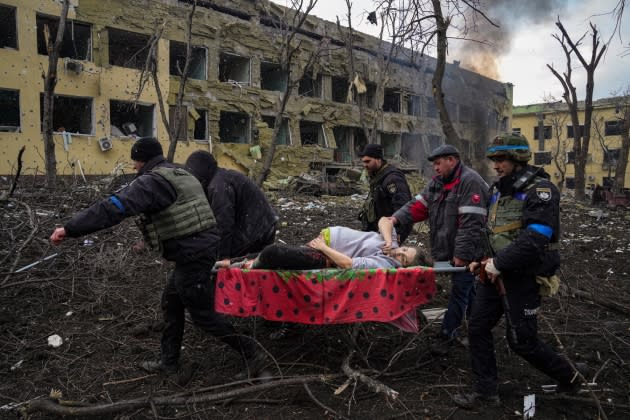’20 Days in Mariupol’ Is a Chilling, You-Are-There Look at the Ukraine War
- Oops!Something went wrong.Please try again later.
- Oops!Something went wrong.Please try again later.

“My brain desperately wants to forget all of this. But the camera will not let it happen.”
The voice on the soundtrack belongs to Mstyslav Chernov, a longtime war correspondent for the Associated Press. He had grown up in Ukraine, in the town of Kharkiv, and was part of a team on assignment in the southern part of the country.
More from Rolling Stone
His Life Was Like a Hollywood Heist Movie. Now, He's Telling His Story
I've Seen Cluster Bombs Maim Children. Why Is Biden Sending Them to Ukraine?
The Scheming Hollywood Superagent Who 'Played God' With Miss America
On Feb. 24, 2002, he was filming the aftermath of a first strike against a Ukrainian military base in Mariupol by Russian troops; by the time he uttered those words above, he’d already bore witness to an unimaginable amount of horror and atrocity for two weeks. It would be another six days before Chernov and his fellow AP journalists Evgeniy Maloletka and Vasilisa Stepanenko would be smuggled out of the area and join a Red Cross convoy to safety. He’d leave Mariupol traumatized, shell shocked, and unable to fully comprehend the destruction he had seen firsthand. But Chernov would also capture what happened in those early days of the Russo-Ukrainian war, and it was because of him and his colleagues that the whole world was watching as well.
A harrowing testament to the power, the necessity, and the toll of documenting life in a combat zone, 20 Days in Mariupol is like a series of journal entries from a season in hell — a you-are-there portrait of Putin’s act of aggression against Ukraine as seen from the inside. (It starts a brief theatrical run this week, then will air on the PBS doc series Frontline this fall.) Chernov had his camera running as a residential neighborhood is bombed, people flee, and martial law is declared. Indiscriminate shelling turns stretches of Mariupol into smoking rubble. Trapped in the center of a city under siege, residents began looting banks and businesses. A maternity ward is bombed, leaving a staggering number of casualties. Mass graves are filled. All the while, Chernov is transmitting footage back to his editors, which is both dismissed as “information terrorism” by Russia and disseminated throughout various media outlets as the sole source of reporting from ground zero.
You’ve likely seen Chernov and his colleagues’ work already, on the front pages of newspapers and broadcast in brief clips on CNN, BBC, and elsewhere. 20 Days takes those snapshots and snippets and expands upon them, showing you the before-and-after surrounding the “highlights” of those nightly TV reports. The film doesn’t just show someone being rushed into a makeshift ER, or a soldier wearily displaying resolve against ongoing assaults. It lets you watch as parents weep over dead loved ones, and doctors frantically perform triage on infants, then rage against the injustice of it all. First-person accounts of hiding in shelters, only to have buildings collapse and become death traps, are recounted with urgency and terror. A headline or a soundbite may describe an incident, but this takes you beyond those and details the extraordinary amount of trauma that accompanies fatalistic disasters. One woman breaks down after describing her house’s windows being blown out and her car catching fire, only to scream at people stealing toys next to her. “War is like an X-ray,” Chernov says, quoting a doctor. “All humans inside become visible. Good people become better. Bad people, worse.”
There aren’t enough trigger warnings in the world to prepare you for what this unflinching documentary demands of a viewer — saying that this is a rough viewing experience doesn’t begin to describe it. Yet 20 Days in Mariupol gives you a sense of life during wartime that isn’t an abstraction, some distant thing happening to people thousands of miles away. The intimate feeling of what it’s like to have your country invaded, your living spaces demolished, and your closest family members killed before your eyes is palpable, and also gut-wrenching. Chernov may be heroic for recording and transmitting out beyond Ukraine’s borders, but heroism, his own or others, is the last thing he’s interested in communicating. Survival is enough. That, and having those who aren’t in the line of fire or behind the camera acknowledge the senselessness and the madness of what’s happening right now. “This is painful to watch,” the filmmaker says. “But it must be painful to watch.”
Best of Rolling Stone
